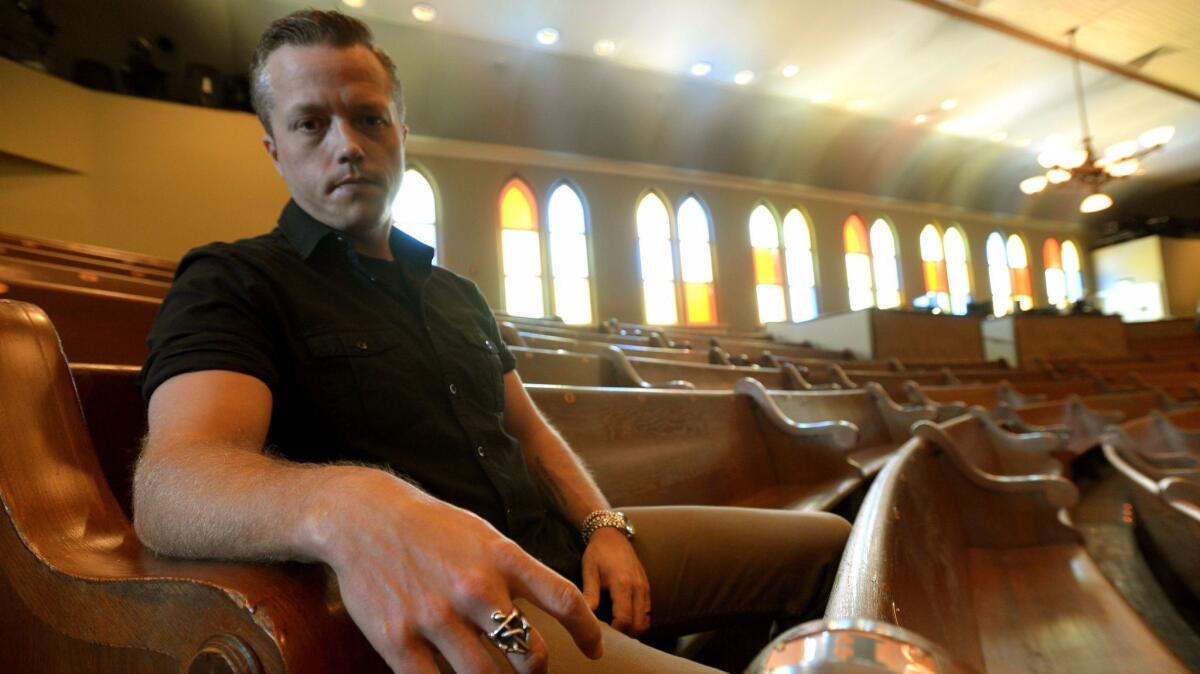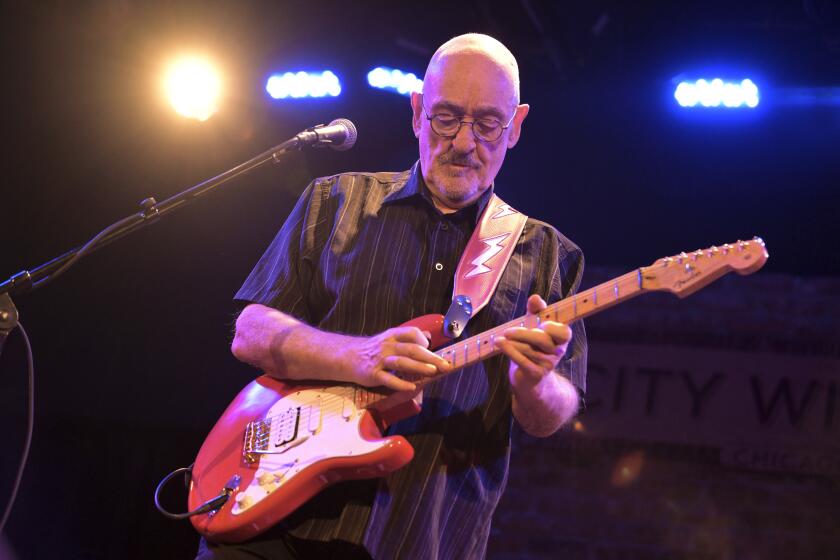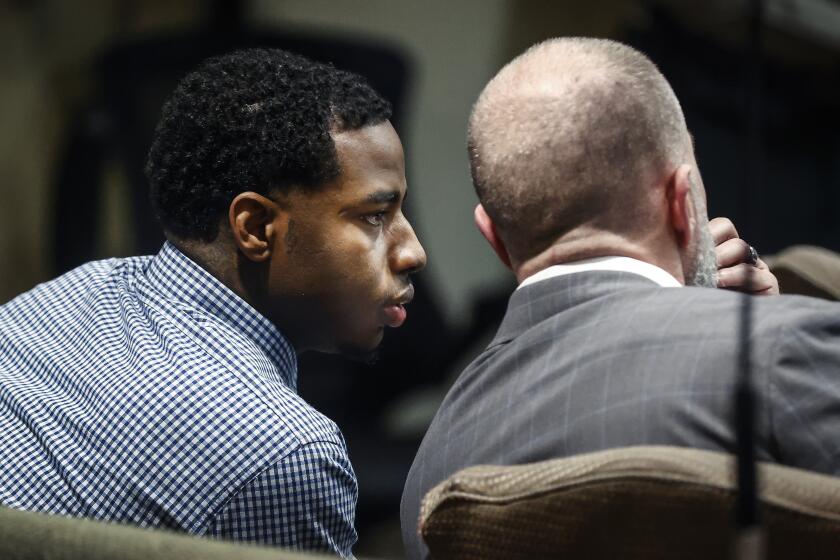Jason Isbell rocks harder on fifth album, ‘The Nashville Sound’

Two songwriters get on a plane, and no, this isn’t a setup for a punch line.
The songwriters in question are widely respected American musicians: Alabama-bred singer-songwriter and former Drive-By Truckers vocalist Jason Isbell and Louisiana-reared singer-songwriter Mary Gauthier. Their in-flight small-talk? Only how artists survive in a shifting digital-first landscape.
“We were talking on a plane — we just wound up next to each other recently — about the changes in the way people buy music and listen to music,” Isbell said while sitting backstage on a recent spring day at the fabled Ryman Auditorium, the so-called Mother Church of Country Music and winter home of the Grand Ole Opry.
“She said, ‘What if this is all just a blip and humanity looks back one day and says ‘Remember when people used to record music and then you’d pay to listen to it — wasn’t that weird?’
See the most-read stories in Entertainment this hour »
“And when you say it that way it does sound like kind of a strange thing to pay for,” said Isbell, whose lanky frame, square jaw, unblinking gaze and carefully combed blond hair combine for the look of a ’50s TV western hero. “But I’m not going to give it away for free until I absolutely have to.”
Lately he hasn’t had to, thanks to the runaway success of his two most recent solo albums, his 2013 commercial breakthrough “Southeastern,” and its 2015 successor, “Something More Than Free,” both of which earned him album of the year honors from the Americana Music Assn. The Recording Academy also bestowed two Grammy Awards on him last year: Americana album (for “Something More Than Free”) and Americana roots song (for “24 Frames”).
Now the musician reared in Muscle Shoals, Ala., is hoping to make it a solo hat trick with his latest, “The Nashville Sound,” recorded with his band, the 400 Unit, and released today.
It’s another impressively literate collection stoked with the kind of insightful songs that have made him one of the bright lights of roots music over the last decade.
With the band’s backing, “The Nashville Sound” rocks harder than its predecessor with songs that explore themes of alienation, isolation, mortality, the joys and burdens of parenthood, family, home and hearth, drawing on Isbell’s arsenal of wit, compassion and his keen understanding of human experience.
His songs often touch on aspects of life in rural America but never settle for superficial nostalgia. That perspective sets him above the crowd, but also apart, something he ruminates on in the album’s opening track, “The Last of My Kind.”
“Nobody here can dance like me,” he sings, “everybody clapping on the one and three,” a line that’s sure to draw smiles from musically savvy listeners.
“A lot of people have mentioned that line,” Isbell said. “My drummer laughed out loud the first time I played him that song. But of course, he would.”
That’s one of the lighter manifestations of the ways Isbell ponders where he fits in, and by extension, how — or whether — the disparate strands of American life can still fit together.
In “White Man’s World,” he questions his cultural legacy: “I’m a white man looking in a black man’s eyes/ Wishing I’d never been one of the guys/ Who pretended not to hear another white man’s joke/ Old times ain’t forgotten.”
The final line quotes the Confederate anthem “Dixie,” and, like many of Isbell’s new songs, resonates at a moment in which a country and its people are wrestling with issues of race relations, political polarization and basic human kindness.
That song, Isbell said, “was inspired by the presidential election. I feel like a lot of people are confusing falling a couple of rungs with falling off the ladder. I think as a society we’re still making a lot of progress. I think just as many people or more people were getting treated unfairly by law enforcement 20, 30 or 40 years ago. We just find out more about it now.
“The government was lying to us an equal or greater amount in those days. Now we have more access to information,” he said. “When something like this happens, when somebody is put on this particular pedestal that [President] Trump has been put upon — partially by Americans, partially by the process — it’s easy to look at it and say we’re failing, and that this movement of compassion is losing to people who are so afraid it makes them selfish.”
The album also contains intensely personal songs, including a reflection on mortality titled “If We Were Vampires,” in which he observes, “If we were vampires and death was a joke/ We’d go out on the sidewalk and smoke/ And laugh at all the lovers and their plans/ I wouldn’t feel the need to hold your hand.”
As Isbell sees it, “The Nashville Sound” emerged to be more directly autobiographical than “Something More Than Free,” which “had some character sketches [and] a lot of untrustworthy narrators.”
“There are a lot of things that were sometimes difficult to write about and reveal and let out of the cage,” he said, “but I went ahead and did that on this album out of a sense of responsibility. So in a lot of ways that points back to ‘Southeastern,’ because that’s really the first time that I had done that in such and open and elaborate way.”
Although he’d been praised for his songwriting in three solo albums that preceded “Southeastern,” as well as for songs he contributed to the Truckers, which he left in 2007, the biggest change in his life and career, he says, was getting sober in 2012.
“It made all the difference,” he said. “I had so much time and so much focus that I didn’t have before. That was really the story. It gave me a story to tell, and it gave people a reason to root for me.
“And it gave me time, which is really the most valuable thing in the world to a writer of any type — to have the time and the focus without being pulled away by darkness or addiction or anything else,” he said. “I could sit in one spot for eight or 10 hours and work on writing. I was very fortunate.”
In fact, he said the pressure he feels now doesn’t revolve around the critical or commercial success he found with “Southeastern” and “Something More Than Free,” but around “the creative breakthrough I feel like I’ve made.”
“I’m not trying to sell X amount of records,” said Isbell, who launched a tour this week in conjunction with the release of “The Nashville Sound,” a round of shows that brings him back to Southern California for a Sept. 17 stop at the Orpheum Theatre in L.A.
“I’m trying to write a certain amount of really, really strong songs every time,” he said. “I feel like a lot of people made one great record, and very few people did it twice. Hardly anybody, as far as percentages go, has made three really great albums. That was a big deal for me, and I really wanted to do it again, just to challenge myself.”
Follow @RandyLewis2 on Twitter.com
For Classic Rock coverage, join us on Facebook
More to Read
The biggest entertainment stories
Get our big stories about Hollywood, film, television, music, arts, culture and more right in your inbox as soon as they publish.
You may occasionally receive promotional content from the Los Angeles Times.










